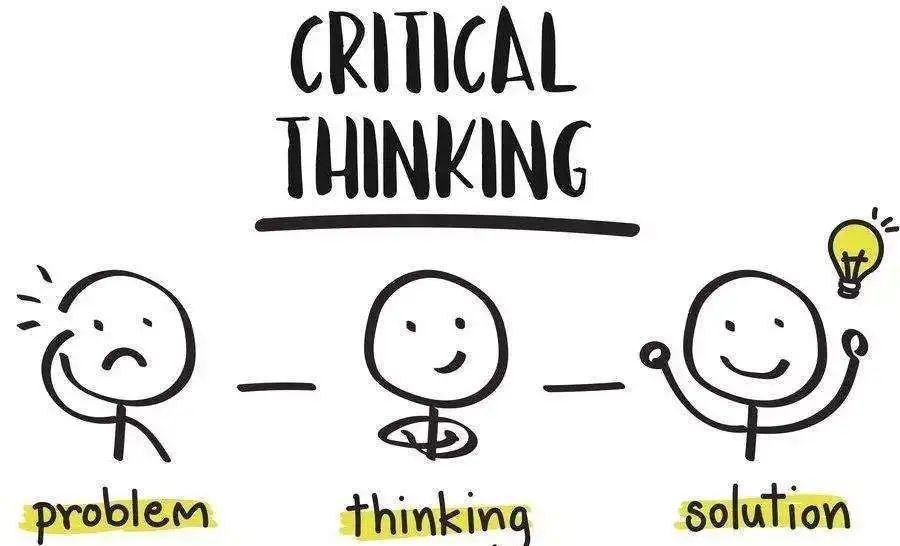The Art of Thinking, by Vincent Ryan Ragiro, is known as the "Bible" in the field of critical thinking, originally titled A Guide to Critical and Creative Thought.
The book begins with a beautiful description of thinking: thinking is an art that has its own goals, standards, principles, laws, strategies, and precautions. Thinking is also an art worth learning, because every important thing we do is influenced by our own habits of thought.
The author graduated from a 985 college in Guangdong, the university motto is "erudite, prudent thinking, discernment, dedication", the school motto of the prudent thinking as an important one, that is, even on the basis of erudition is to have their own independent thinking, there will be better innovation, just like this book, Critial and Creative Tought, critical thinking and creative ideas, this is worthy of admiration.

< h1 class="pgc-h-arrow-right" > the importance of thinking</h1>
If you want to be a good problem solver, you need not only factual knowledge, but also careful thinking. To appreciate the importance of thinking, you need to put yourself in an environment that faces a variety of different situations, how to analyze disputes, solve problems and make decisions. In daily life, no matter how to choose a major, choose a career, or even go out to see how to dress people, it is after some thinking. Meeting the challenges and seizing the opportunities presented by the global economy requires creative and critical thinking skills.
Good thinkers are not all born, but can be nurtured. Some people have a higher talent for thinking than others, so they can learn new knowledge faster and better, which in turn makes the ability to think stronger than others. But as long as it is cultivated, the thinking ability of ordinary people can also be effectively improved, and the difficulty of improving thinking ability depends on your habits and attitudes.
<h1 class="pgc-h-arrow-right" > how to cultivate</h1>
Consideration time: 1 hour in the best state is more efficient than 2 or 3 hours in poor condition;
Consider the location: For example, you need a more suitable environment for reading and learning, and you can often read two or three ordinary books in a day in the library, but it is difficult to do it in your own home. Choose the right place according to your habits and see in which environments you can better stimulate your thinking ability.
Consideration: Some people need some inspiration to think, maybe you are used to having a cup of tea, a cup of coffee, or need a suitable piece of music, or need to listen to the sounds of nature in a corner of the campus. Create the conditions for your own thinking.
Learn to be engrossed: Staying engrossed means being able to turn our attention to the purpose and problems of our thinking when our minds are wandering. Don't worry if you are interrupted, as long as you can adjust it in time, you can return to the main line of thinking more efficiently.
Coping with setbacks: Confusion of thinking, psychological disorders, etc. will affect thinking, and a good thinker can master strategies for coping with setbacks.
Another advantage of this book is that there are thinking training questions at the end of each chapter, and when you are bored, you may wish to open a thinking training.
<h1 class="pgc-h-arrow-right" > abandon bad habits</h1>
There are six bad habits that hinder thinking – "I am better", face-loving, refusal to change, conformism, stereotyping, and self-deception. All need to be overcome with care.
"I am better": This habit may have been there since childhood, and even when I was a child, there are many people who always think that they are the center of the universe, and I am one of them. This habit does not disappear easily, the habit of "I am better" has existed in human society for a long time, but it will hinder our thinking, destroy objectivity, and make us prone to self-inflation.
Love face: Loving face is easy to cause shirking responsibility, finding reasons, "It's not my fault, I have no other choice" and so on. People who refuse to admit their mistakes deepen the seriousness of their mistakes.
Refusal to change: Rejection of change is a tendency to reject new views and practices without thinking. Rejection of change is the usual response to creative things, which is also a normal manifestation, because the brain is habitually lazy, and accepting new changes means adopting new patterns. But overcome this laziness.
Conformity: The right way to approach conformity is to think for yourself, without worrying about how many people support your point of view.
Stereotypes: Stereotypes are the extreme form of generalization, which categorizes people, places, and ideas according to basic elements. Existential stereotypes lead to the application of predetermined and well-judged ideas to things, thus hindering the activity of the mind.
Self-deception: Many people also have self-deception in their understanding of their own abilities, and if they are used to pretending to know a lot, they will really believe that they really know a lot. They often think they're right, which is tantamount to an ass deciding on the head.
< h1 class="pgc-h-arrow-right" > postscript</h1>
Good thinking skills will not only make you more efficient in writing and speaking, but also make yourself more discerning. Erudition is input, the learning of knowledge, and the acceptance of external knowledge, while prudent thinking is the processing of the knowledge and information learned, self-screening, and then through critical and creative thinking, to select the best and use. Repeating this, your knowledge of input is richer and more efficient, and then you can better output, and the output is all your personal performance. Friends who have time, may wish to read it.
Books similar to this book include Critical Thinking, Learning to Ask Questions, Concentration, A Simple Introduction to Logical Thinking, Critical Thinking Tools, The Wisdom of Decision-Making, and Changing Questions, Changing Lives.